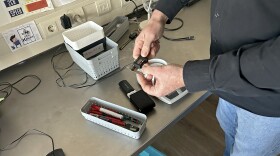Pro Football Hall of Famer Emmitt Smith and reality star-turned-recovery advocate Zac Clark brought a blunt message to Louisiana State University students in Baton Rouge: opioid overdoses are a public health emergency that can be fought with simple tools and a little common sense.
This fall marks Smith’s third year with the Ready to Rescue initiative, a public-education campaign focused on breaking down the stigma around opioid overdoses and teaching people how to save lives with naloxone nasal spray — commonly known by the name brand Narcan.
Smith’s and Clark’s appearance at LSU on Tuesday was part of a tour of college campuses across the country this semester to combine short talks with hands-on training for students. They’ll also hand out naloxone nasal spray kits — a strategy both men described as basic lifesaving preparedness they’re using their celebrity statuses to promote.
“I would just say to whom much is given, much is required,” Smith said. “At the end of the day, there comes a great deal of responsibility we have with the level of influence that we might have.”
Organizers say the goal of the tour is straightforward: remove shame, correct misconceptions and put a lifesaving medication into the hands of people who will be on campus now and in the years to come.
Drug use is prevalent among college students. But with powerful opioids like fentanyl appearing in drug markets as the opioid crisis continues, the risk of overdose is much greater than in previous generations.
Smith, who has publicly discussed losing teammates and people close to his family to overdose, said Ready to Rescue taught him there are concrete steps everyone can take to help.
“The reality of the fact is sometimes we don't think that we have the ability to help, but there are things and tools out there that you can equip yourself with to be able to assist someone that might be in need,” Smith said.
Clark, the founder and CEO of Release Recovery, also known for his role as a contestant on the 16th season of The Bachelorette, has been in recovery for 14 years. He framed naloxone nasal spray as a modern and essential harm-reduction tool.
“Narcan wasn't as prevalent 15, 16 years ago when I was out there injecting heroin into my body and doing OxyContin and using drugs in a really significant way. Fentanyl wasn't out there as well,” Clark said. “I certainly would have overdosed, and I certainly would have died if someone close to me didn't have the medication.”
The campus events aim not only to distribute naloxone but to normalize carrying it and knowing how to use it. Smith stressed the practical payoff of equipping people with the life-saving medication.
“If there is a situation, Narcan may be top of mind to jump right in and be ready to rescue,” Smith said. “Versus just assuming that a person's gonna be OK.”
Both Smith and Clark said a central obstacle is misinformation — the mistaken belief that harm-reduction measures somehow encourage drug use. Smith pushed back on that notion.
“Taking Tylenol does not promote drug use. Drinking water does not promote dehydration,” Smith said. “Use your common sense.”
Clark echoed the call to action for young people, saying that with school back in session, so too are parties and opportunities to encounter and use drugs.
“They're going to explore just like I did, and I don't have any judgment around that. I was a kid once, too,” Clark said. “But there's a chance that that drug is laced, and there's a chance it's laced with fentanyl, and a chance of that person trying drugs for the very first time has an overdose, and what a tragedy it would be for us to lose someone like that because Narcan is not available.”
This story was produced by the Gulf States Newsroom, a collaboration between Mississippi Public Broadcasting, WBHM in Alabama, WWNO and WRKF in Louisiana and NPR. Support for public health coverage comes from The Commonwealth Fund.












